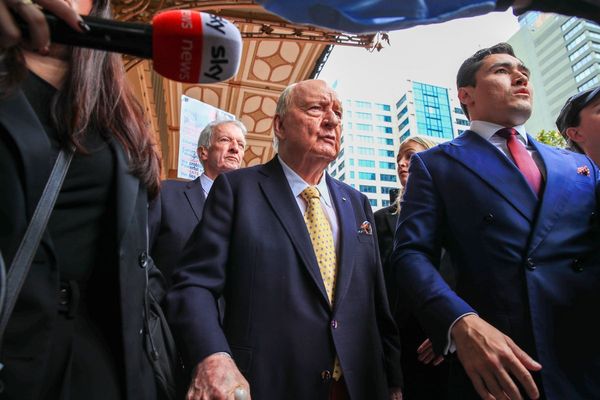The bank rally slowed Tuesday after the major indexes shed early gains. First Republic, Charles Schwab, Fidelity National Financial and Citigroup lead the S&P 500. But Zions, Fifth Third, Regions Financial posted slight gains after briefly turning negative following the morning's rebound riding on optimism tied to the FDIC's Monday moves to contain what appeared to be a widening bank crisis.
The FDIC closed and took control of Silicon Valley Bank, subsidiary of SVB Financial, and Signature Bank on Friday and Sunday, respectively. Banking activities resumed Monday while the feds search for buyers for the firms. And regulators approved a systemic risk exception for both banks to guarantee "all depositors of the institution will be made whole."
Bank Stock Action Tuesday
First Republic led Tuesday's rebound, leaping 27.8% after FRC stock cratered 61.8% Monday. Charles Schwab closed 9.2% higher Tuesday as shares were on track to post their largest decline on record. Fidelity National stock recovered 7% higher Tuesday after dropping 12.9% Monday. Citi stock rose 5.9% Tuesday, and Keycorp climbed 6.9% following its 27% decline Monday. Western Alliance stock jumped roughly 14.3% after briefly turning negative.
Zions Bancorp stock rose 4.5% Tuesday after turning negative following an initial 14.5% rebound Tuesday. Shares tumbled 25.7% yesterday. FITB stock closed up 0.5% and Regions Financial shares edged 0.6% higher after falling in the afternoon. Huntington Bancshares stock fell 0.63% Tuesday.
Moody's Downgrades Banking Outlook, Reviewing Six Banks
Late Monday, Moody's Investors Service cut its outlook on the U.S. banking system to negative from stable, CNBC reported. "We have changed to negative from stable our outlook on the US banking system to reflect the rapid deterioration in the operating environment following deposit runs at Silicon Valley Bank (SVB), Silvergate Bank, and Signature Bank (SNY) and the failures of SVB and SNY," the rating agency wrote.
Moody's expects pressures to persist while interest rates remain high. "U.S. banks also now are facing sharply rising deposit costs after years of low funding costs, which will reduce earnings at banks, particularly those with greater portion of fixed-rate assets," Moody's said. The agency also noted that banks with substantial unrealized securities losses and uninsured depositors are still at risk.
Moody's also announced it is reviewing six regional banks for potential ratings downgrades to reflect "the extremely volatile funding conditions for some U.S. banks exposed to the risk of uninsured deposit outflow."
First Republic Bank, Intrust Financial, UMB Financial, Zions Bancorp, Western Alliance Bank and Comerica all received downgrade warnings. The agency will focus its review on variations in bank deposit amounts since the beginning of the year, the "stickiness" of deposits going forward, and amount of securities sold to address deposit outflows.
FDIC Moves
When the FDIC took over of Silicon Valley and Signature Bank, they removed senior management and transferred the assets to a bridge bank, which is a full-service bank operated by the agency while it finds potential bidders. Regulators failed to auction off SVB over the weekend and they're planning a second auction, though the timetable is unclear, the Wall Street Journal reports.
As part of the systemic risk exceptions, depositors "will be made whole," while shareholders and certain unsecured debtholders will not be protected. Government officials say "no losses will be borne by taxpayers," and it'll be funded via fees pay to the Deposit Insurance Fund, President Biden tweeted Monday. And Sunday, the Federal Reserve Board announced it will make additional funding available to eligible institutions to assure banks have the ability to meet all their depositors' needs.
Bank Stocks Reel Monday, Market Rebounds On Biden Comments
The market opened lower on Monday. Stocks reversed sharply higher around 9:50 a.m., as President Biden discussed measures taken to avert a meltdown.
"Thanks to the quick action of my administration over the past few days, Americans can have confidence that the banking system is safe," he said in televised remarks. Biden said he would ask Congress and regulators to strengthen banking rules to, "make it less likely this kind of bank failure would happen again."
Silicon Valley Bank Panic Crashes 10 Bank Stocks - Is Yours OK?
Financial stocks continued to drop Monday after dramatic losses Friday, with most of the harshest selling focusing on banks located nearest to Silicon Valley. Trading for San Francisco-based First Republic was temporarily halted early Monday after FRC stock fell 61.8% after trading resumed.
Shares of Western Alliance Bancorp toppled 80% after Monday's opening bell, triggering a short trading halt. The stock closed 47% lower. PacWest Bancorp, based in Phoenix, clawed back losses to close 21% lower Monday, after an early trading halt. Salt Lake City-based Zions retreated 25.7% Monday.
Some non-western banks caught up in the scrum included First Horizon. Trading in the Memphis-based bank halted briefly Monday as FHN stock fell 20.2%. Birmingham, Ala.-headquartered Regions Financial was paused during the day and slid 7.1%.
Charles Schwab closed down 11.6% after sliding 23% Monday morning. Schwab stock is on track for its largest decrease on record. Bank of America weakened 5.8%. Schwab is based in Texas, BAC in Charlotte, N.C.
Dow Jones stock JPM stock pared early losses to 1.8% Monday. It climbed 2.5% Friday, one of the day's few banking bright spots.
Western Alliance, Federal Home Loan Banks Bolster Reserves
Western Alliance Bank increased its borrowing capacity and took "additional steps to strengthen its liquidity position to ensure we are in a position to meet all our client funding needs," CEO Kenneth Vecchione wrote in a Monday filing with the SEC. As of Monday morning, its cash reserves exceeded $25 billion "and are growing," while deposit outflows have been moderate, Vecchione wrote. The bank's insured deposits, including accounts eligible for pass-though insurance, exceed 50% of its total deposits.
Elsewhere, Federal Home Loan Banks system is raising $64 billion in short-term notes sales, Bloomberg reported Monday. The bank system is a key cash supplier for regional banks without turning to the Federal Reserve, and it's bulking up its available capital in case more banks need to tap it for funds.
Bank Crisis: Signature Bank Closed
On Sunday, state regulators closed New York-based Signature Bank and appointed the FDIC as the receiver. Signature Bank is the 20th largest bank in the U.S. Roughly 30% of its deposits came from crypto customers.
The Federal Deposit Insurance Corp. transferred all deposits and "substantially" all of the assets to Signature Bridge Bank. The bridge bank is a full-service bank, which the agency will operate as it markets the institution to potential bidders.
As of Dec. 31, Signature Bank had $110.4 billion in total assets and $82.6 billion in deposits. Signature Bank operations and banking activities will resume Monday, March 13. Regulators guarantee that, "all depositors of the institution will be made whole. No losses will be borne by the taxpayers." In a joint press release Sunday, Treasury Secretary Janet Yellen, Fed Chair Jerome Powell and FDIC Chair Martin Gruenberg approved systemic risk exceptions for Signature Bank to soothe fears of a bank crisis.
"Today we are taking decisive actions to protect the U.S. economy by strengthening public confidence in our banking system," the regulators wrote in the release. "This step will ensure that the U.S. banking system continues to perform its vital roles of protecting deposits and providing access to credit to households and businesses in a manner that promotes strong and sustainable economic growth."
A Special Assessment On Banks
Regulators approved similar systemic risk exceptions for Silicon Valley Bank. Shareholders and certain unsecured debtholders will not be protected. In addition, officials removed senior management, according to the announcement. Any losses to the Deposit Insurance Fund to support uninsured depositors will be recovered by a special assessment on banks, as required by law. And Sunday, the Federal Reserve Board announced it will make additional funding available to eligible institutions to assure banks have the ability to meet all their depositors' needs.
Silicon Valley Bank Failure Sparks Panic - Are You FDIC Insured?
"The U.S. banking system remains resilient and on a solid foundation, in large part due to reforms that were made after the financial crisis that ensured better safeguards for the banking industry," regulators wrote. "Those reforms combined with today's actions demonstrate our commitment to take the necessary steps to ensure that depositors' savings remain safe."
First Republic Shores Up Funds
On Monday, First Republic CEO Jim Herbert told Jim Cramer the bank is operating "business as usual," that there aren't that many liquidations above $250,000 and the additional funding from JPMorgan is working.
On Sunday, First Republic Bank secured additional liquidity from the Federal Reserve Bank and JPMorgan to shore up its operations. The additional borrowing capacity brings the total available, unused liquidity to fund operations to more than $70 billion, the company announced in a press release.
"First Republic's capital and liquidity positions are very strong, and its capital remains well above the regulatory threshold for well-capitalized banks," CEO Jim Herbert said in the announcement.
Meanwhile on Monday, Bank of America removed its rating price target on First Republic, from its previous Buy rating and $90 price target. The unexpected bank failures resulted in First Republic "no longer trading on fundamentals," and made the previous targets unreliable, Bank of America wrote in a research note.
PacWest Operations Update
On Friday, following the Silicon Valley Bank failure, PacWest Bancorp released an operations update on its current liquidity. PacWest listed $41 billion in assets and $33.2 billion in deposits as of March 9. The Los Angeles-based bank lists $28.3 billion in loan balances, $1.9 billion in cash on hand, $5.3 billion in liquid securities and about $2 billion available from the Federal Reserve Discount Window.
"Though the banking industry is experiencing significant volatility in light of recent events, we want to reiterate that Pacific Western Bank is a well-performing, well-diversified, full-service commercial bank with more than 20 years of history," CEO Paul Taylor said in the release. "We have been a proven partner to our customers through all economic cycles and are actively adapting in the current economic environment."
Following the update, DA Davidson analyst Gary Tenner upgraded PacWest to Buy from Neutral on Monday, but lowered the price target to 29 from 31. The bank's financial update was largely in-line with the firm's Q1 expectations, despite contagion concerns, Tenner wrote in a research note.
Cryptocurrency Prices Rally
Meanwhile, cryptocurrency prices rallied Monday after jumping Sunday following the FDIC statement on Signature Bank. Coinbase bolted more than 9% after announcing it expects to "fully recover" its deposits from Signature. The stablecoin USD Coin reclaimed its $1 level Monday after losing its dollar peg and falling to 86 cents Saturday. Bitcoin and ethereum both leapt on double-digit gains Monday.
You can follow Harrison Miller for more stock news and updates on Twitter @IBD_Harrison







